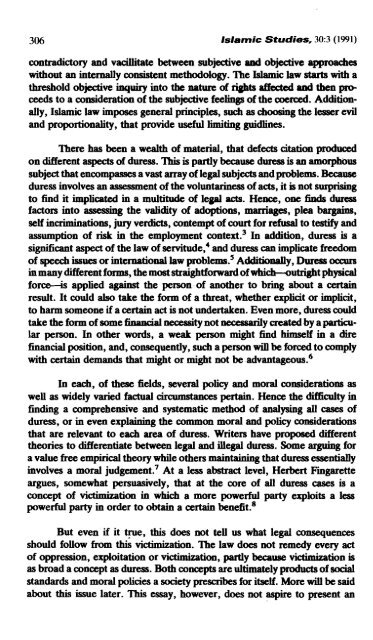LAW OF DURESS IN ISLAMIC LAW AND COMMON LAW: A ...
LAW OF DURESS IN ISLAMIC LAW AND COMMON LAW: A ...
LAW OF DURESS IN ISLAMIC LAW AND COMMON LAW: A ...
You also want an ePaper? Increase the reach of your titles
YUMPU automatically turns print PDFs into web optimized ePapers that Google loves.
306 Islamic Studies, 30:3 (1991)<br />
contradictory and vacillitate between subjective and objective epproaches<br />
without an internally consistent methodology. The Islamic law starts with a<br />
threshold objective inquiry into the nature of rights affected and then pro-<br />
ceeds to a consideration of the subjective feelings of the coerced. Addition-<br />
ally, Islamic law imposes general principles, such as choosing the lesser evil<br />
and proportionality, that provide useful limiting guidlines.<br />
'Zhere has been a wealth of material, that defects citation produced<br />
on difierent aspects of duress. This is partly because duress is an amorphous<br />
subject that encompasses a vast array of legal subjects and problems. Because<br />
duress involves an assessment of the voluntariaess of acts, it is not surprising<br />
to find it implicated in a multitude of legal acts. Hence, one finds duress<br />
factors into assessing the validity of adoptions, marriages, plea bargains,<br />
self incriminations, jury verdicts, contempt of court for refusal to testify and<br />
assumption of risk in the employment conte~t.~ In addition, duress is a<br />
significant aspect of the law of senritude: and duress can implicate freedom<br />
of speech issues or inten-iational law problems.5 Additiody, Duress ocws<br />
in many different forms, the most straightfornard of whihutright physical<br />
f o d s applied against the person of another to bring about a certain<br />
result. It could also take the form of a threat, whether explicit or implicit,<br />
to harm someone if a certain act is not undertaken. Even more, duress could<br />
take the form of some financial necessity not necessarily created by a particular<br />
person. In other words, a weak person might find himself in a dire<br />
financial position, and, consequently, such a person will be forced to comply<br />
with certain demands that might or might not be ad~antageous.~<br />
In each, of these fields, several policy and moral considerations as<br />
well as widely varied factual cinwnstances pertain. Hence the difficulty in<br />
finding a comprehensive and systematic method of analysing all cases of<br />
duress, or in even explaining the common moral and policy considerations<br />
that are relevant to each area of duress. Writers have proposed different<br />
theories to differentiate between legal and illegal duress. Some arguing for<br />
a value free empirical theory while others maintaining that duress essentially<br />
involves a moral judgement? At a less abstract level, He*rt Fingarette<br />
argues, somewhat persuasively, that at the core of all duress cases is a<br />
concept of victimization in which a more powerful party exploits a less<br />
powerful party in order to obtain a certain benefit.'<br />
But even if it true, this does not tell us what legal consequences<br />
should follow from th& victimization. The law does not remedy every act<br />
of oppression, exploitation or victimization, partly because victimization is<br />
as broad a concept as duress. Both concepts are ultimately products of social<br />
standards and moral policies a society prescribes for itself. More will be said<br />
about this issue later. This essay, however, does not aspire to present an
















